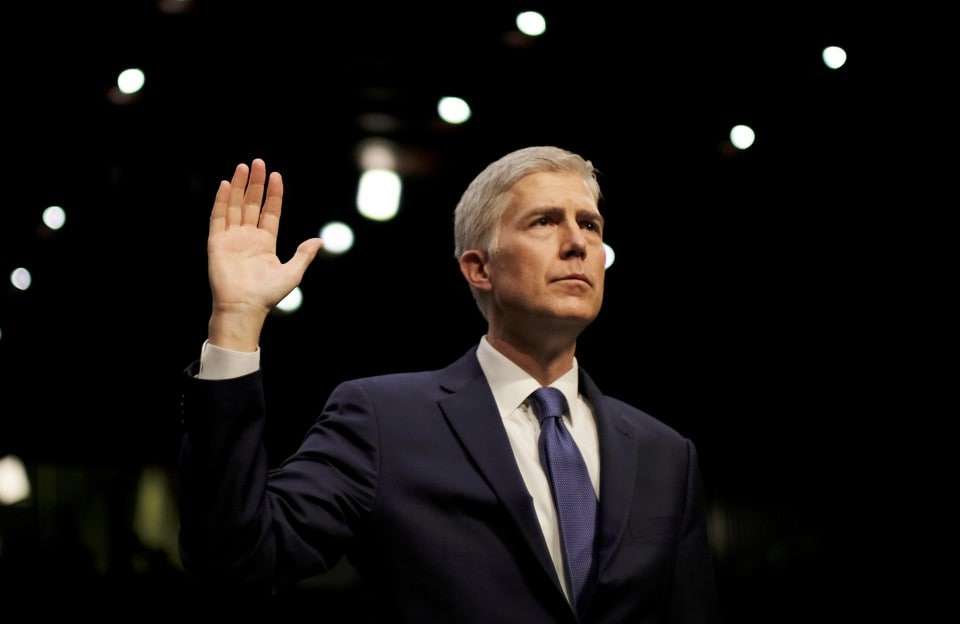The Volokh Conspiracy
Mostly law professors | Sometimes contrarian | Often libertarian | Always independent
The politics of personal destruction: Neil Gorsuch edition

In a last-ditch effort to scuttle his confirmation to the Supreme Court, opponents of Judge Neil Gorsuch have been trying to place negative stories about the judge with Washington reporters - anything to keep this distinguished and highly qualified jurist off the bench.
Late last night, these efforts bore fruit as Politico and BuzzFeed ran stories alleging that a few portions of Gorsuch's book, which is based upon his dissertation, borrow or copy from unattributed sources. The allegations are a surprise and seem quite out of character for Gorsuch, given the widespread praise he has received for his writings and opinions. As BuzzFeed notes, Gorsuch "has been an appellate judge for more than a decade. In all that time, he has been praised for his writing and has never been accused of plagiarism in his more than 200 opinions on the bench."
Both stories focus on a particular passage in Gorsuch's book and supplement that discussion with other, less incriminating examples. Both also note that those who supervised Gorsuch's dissertation, when asked to review specific charges against Gorsuch, said that they were unconcerned. Princeton University's Robert George, who is an also an editor at Princeton University Press's New Forum Books, also commented:
Judge Gorsuch did not attempt to steal other people's intellectual property or pass off ideas or arguments taken from other writers as his own. In no case did he seek credit for insights or analysis that had been purloined.
From what I've had the chance to review, there are a few instances in which Gorsuch was sloppy in failing to properly attribute a source. One passage in particular is concerning and would merit investigation under the academic standards with which I'm familiar. That's unfortunate, but I don't think it has a significant bearing on his fitness for the court. Gorsuch is a rightly esteemed judge; he's not infallible. As the BuzzFeed piece notes, from the evidence available, this error seems strikingly out of character.
From what I've seen, I suspect Gorsuch had referred to the source in question and, in revisions and editing, made an oversight. I base this assumption on the fact that the allegations concern only a few passages out of several hundred pages.
In my experience, it takes a pattern of misattribution to condemn a student's work, not an isolated mistake or two. And given the number of public figures whose careers have survived more serious allegations of plagiarism, that certainly appears to be the standard in public life as well.
In book publishing, it is commonplace for there to be a handful of attribution errors over the course of hundreds of pages, and to correct such errors in subsequent editions if and when they are found. When prominent book writers have been found to have made such errors (think Doris Kearns Goodwin) it is often because the author of the original book complains and, in some cases, threatens suit.
Today, however, there is software that that will search manuscripts for language that parallels anything in a wide range of publicly accessible databases. I suspect that is what was used here by whatever outfit shopped this material to BuzzFeed and Politico. If I am right, this would tend to confirm my supposition that Gorsuch may have made a mistake but did not engage in a pattern of misattribution. After all, if there was more there, I suspect it would have been found.
Politico discloses that its report is based upon "documents provided to Politico" (perhaps by one of those "dark money" groups that Sen. Sheldon Whitehouse, a Democrat of Rhode Island, is so concerned about). What Politico does not report is that much of the material it was provided did not pan out. Based on documents I viewed in the process of my reporting, when Politico reporters contacted the White House for a response, they sought comment on numerous examples of claimed plagiarism that were laughable, e.g. suggesting commonplace descriptions of well-known works were examples of copying and claiming Gorsuch failed to cite works that are, in fact, cited in his book. At one point, it was even alleged that a quotation of Justice Oliver Wendell Holmes's most infamous lines from Buck v. Bell ("Three generations of imbeciles are enough.") was evidence of plagiarism. It's too bad Politico didn't disclose that some of the allegations it investigated were so empty, as it would have informed readers a bit about the nature of these attacks and further suggested that this is evidence of a few isolated mistakes, rather than a pattern of misconduct.
Those seeking to tear down Gorsuch do not care about whether he is qualified to sit on the Supreme Court or whether their attacks are accurate. They are not seeking to protect academic integrity. They also do not care whether the nominee has an opportunity to respond - hence the timing of the attacks.
This is an effort to destroy a judicial nominee because he had the wrong judicial philosophy and was appointed by the wrong president. It's a symptom of the poison that has been accumulating within the judicial nomination process for the past three decades. It's also a warning to future nominees. If there's anything that can be used to tear you down - your work as a student, your video rentals, perhaps even your browsing history - someone will try to find it and use it against you (and if they need only 41 votes to stop you, the more valuable even marginally incriminating material will be). It's an ugly business, and it demeans us all.
UPDATE: For a slightly more critical view, see this piece by Noah Feldman.
SECOND UPDATE: Ann Althouse offers a poll.


Show Comments (0)